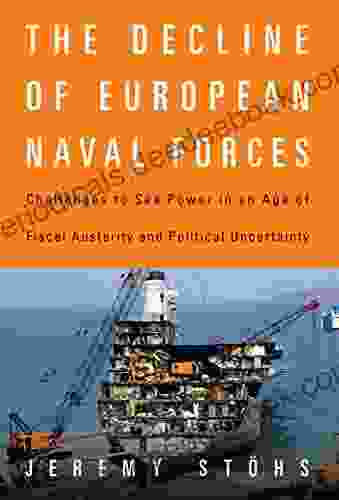Challenges to Sea Power in an Age of Fiscal Austerity and Political Uncertainty: Assessing the Impact on Global Security

Sea power has long been a critical element of global security, providing nations with the ability to project power, protect their interests, and maintain freedom of navigation. However, in recent years, sea power has faced a number of challenges, including fiscal austerity and political uncertainty. These factors have had a significant impact on naval capabilities, operations, and strategy, and have raised questions about the future of sea power in the 21st century.
5 out of 5
| Language | : | English |
| File size | : | 8572 KB |
| Text-to-Speech | : | Enabled |
| Screen Reader | : | Supported |
| Enhanced typesetting | : | Enabled |
| Word Wise | : | Enabled |
| Print length | : | 312 pages |
The Impact of Fiscal Austerity
Fiscal austerity measures, which involve reducing government spending and increasing taxes, have been implemented by many countries in response to the global economic crisis. These measures have had a significant impact on naval budgets, leading to cuts in procurement, maintenance, and operations. As a result, many navies have been forced to reduce the size of their fleets, decommission older ships, and cancel or delay new construction programs.
For example, the United States Navy, which has the world's largest fleet, has been forced to reduce its size from 285 ships in 2010 to 272 ships in 2015. The Navy has also been forced to cancel or delay a number of new construction programs, including the Littoral Combat Ship (LCS) and the Zumwalt-class destroyer.
The impact of fiscal austerity on naval capabilities has been compounded by the rising cost of shipbuilding and maintenance. The cost of building a new destroyer has increased from $1 billion in the 1980s to over $3 billion today. The cost of maintaining a destroyer has also increased significantly, from $20 million per year in the 1980s to over $50 million per year today.
The Impact of Political Uncertainty
Political uncertainty has also had a significant impact on sea power. The rise of populism and nationalism has led to a decline in public support for international cooperation and collective security. This has made it more difficult for navies to operate in a global environment and has led to increased tensions between nations.
For example, the United States has withdrawn from the Trans-Pacific Partnership (TPP) and the Paris Agreement on climate change. This has raised concerns about the future of US security commitments in the Asia-Pacific region and elsewhere.
The rise of China has also contributed to political uncertainty. China's rapid military modernization and its increasingly assertive foreign policy have raised concerns about its intentions in the Asia-Pacific region. This has led to increased tensions between China and its neighbors, and has made it more difficult for the United States to maintain its dominance in the region.
The Impact on Global Security
The challenges to sea power in an age of fiscal austerity and political uncertainty have had a significant impact on global security. The reduction in naval capabilities has made it more difficult for navies to maintain freedom of navigation, protect their interests, and deter aggression. This has created a vacuum in which other actors, such as China and Russia, have been able to expand their influence.
The decline in public support for international cooperation and collective security has also made it more difficult for navies to operate in a global environment. This has led to increased tensions between nations and has made it more difficult to address common security challenges, such as piracy and terrorism.
The Future of Sea Power
The challenges to sea power in an age of fiscal austerity and political uncertainty are likely to continue in the years to come. This will have a significant impact on the future of sea power and on global security. Navies will need to adapt to these challenges by developing new capabilities, operating more efficiently, and building stronger partnerships with other countries.
One way that navies can adapt to the challenges of fiscal austerity is to develop new capabilities that are more affordable and more efficient. For example, navies can invest in unmanned systems, which can be used to perform a variety of tasks, from surveillance to mine warfare. Navies can also invest in new technologies, such as directed energy weapons, which can be used to defend against a variety of threats.
Another way that navies can adapt to the challenges of fiscal austerity is to operate more efficiently. Navies can do this by reducing the size of their fleets, consolidating their operations, and increasing their use of outsourcing. Navies can also improve their efficiency by investing in new technologies, such as automated systems and predictive maintenance.
Finally, navies can adapt to the challenges of fiscal austerity by building stronger partnerships with other countries. Navies can do this by participating in joint exercises, sharing information, and developing common standards and procedures. Navies can also build stronger partnerships with other organizations, such as the United Nations and the International Maritime Organization.
The challenges to sea power in an age of fiscal austerity and political uncertainty are significant. However, Navies can adapt to these challenges by developing new capabilities, operating more efficiently, and building stronger partnerships with other countries. By ng so, navies can continue to play a vital role in global security.
5 out of 5
| Language | : | English |
| File size | : | 8572 KB |
| Text-to-Speech | : | Enabled |
| Screen Reader | : | Supported |
| Enhanced typesetting | : | Enabled |
| Word Wise | : | Enabled |
| Print length | : | 312 pages |
Do you want to contribute by writing guest posts on this blog?
Please contact us and send us a resume of previous articles that you have written.
 Novel
Novel Story
Story Genre
Genre Reader
Reader Paperback
Paperback Paragraph
Paragraph Sentence
Sentence Shelf
Shelf Synopsis
Synopsis Annotation
Annotation Manuscript
Manuscript Scroll
Scroll Codex
Codex Classics
Classics Library card
Library card Narrative
Narrative Biography
Biography Reference
Reference Encyclopedia
Encyclopedia Dictionary
Dictionary Thesaurus
Thesaurus Character
Character Librarian
Librarian Borrowing
Borrowing Stacks
Stacks Periodicals
Periodicals Research
Research Scholarly
Scholarly Lending
Lending Reserve
Reserve Academic
Academic Journals
Journals Special Collections
Special Collections Interlibrary
Interlibrary Literacy
Literacy Study Group
Study Group Awards
Awards Reading List
Reading List Theory
Theory Textbooks
Textbooks Bruce L R Smith
Bruce L R Smith Bruno Maiorana
Bruno Maiorana Bernard Scott
Bernard Scott Paul Reitter
Paul Reitter Fiona Valpy
Fiona Valpy Oscar Fleming
Oscar Fleming Shawn F Morris
Shawn F Morris Mario Costanzo
Mario Costanzo Shawn Peters
Shawn Peters Rita Kirk
Rita Kirk Dl Jones
Dl Jones Marques Vickers
Marques Vickers Vivien Gorham
Vivien Gorham John Kingston
John Kingston Renee Rigdon
Renee Rigdon Diamon Whitney Amos
Diamon Whitney Amos Joyce Murphy
Joyce Murphy Paul Sanden
Paul Sanden Jeffrey C Hooke
Jeffrey C Hooke Kathleen V Kudlinski
Kathleen V Kudlinski
Light bulbAdvertise smarter! Our strategic ad space ensures maximum exposure. Reserve your spot today!

 Jayson PowellSister Sarah Pick Predictive Method System: Unlock the Secrets to Lottery...
Jayson PowellSister Sarah Pick Predictive Method System: Unlock the Secrets to Lottery...
 Jake PowellHidden Enemies Lenora Worth: A Literary Exploration of Intrigue, Danger, and...
Jake PowellHidden Enemies Lenora Worth: A Literary Exploration of Intrigue, Danger, and...
 Bryan GrayThe Human Environment: A Closer Look at National Geographic's Groundbreaking...
Bryan GrayThe Human Environment: A Closer Look at National Geographic's Groundbreaking... John Dos PassosFollow ·12k
John Dos PassosFollow ·12k José MartíFollow ·2.5k
José MartíFollow ·2.5k Elias MitchellFollow ·19.8k
Elias MitchellFollow ·19.8k Rick NelsonFollow ·13.1k
Rick NelsonFollow ·13.1k Harry HayesFollow ·4.4k
Harry HayesFollow ·4.4k Ross NelsonFollow ·4.2k
Ross NelsonFollow ·4.2k Ignacio HayesFollow ·16.2k
Ignacio HayesFollow ·16.2k Raymond ChandlerFollow ·3k
Raymond ChandlerFollow ·3k

 Anton Chekhov
Anton ChekhovClarinet Fundamentals: A Systematic Fingering Course for...
Welcome to the exciting world of...

 Gage Hayes
Gage HayesSea Prayer: A Haunting and Heartbreaking Story of...
Sea Prayer, the latest...

 Henry Green
Henry GreenPillars of Society Rosmersholm Little Eyolf When We Dead...
Henrik Ibsen, the towering...

 Robert Reed
Robert Reed10 For 10 Sheet Music Classical Piano Favorites: A...
Learning to play the...
5 out of 5
| Language | : | English |
| File size | : | 8572 KB |
| Text-to-Speech | : | Enabled |
| Screen Reader | : | Supported |
| Enhanced typesetting | : | Enabled |
| Word Wise | : | Enabled |
| Print length | : | 312 pages |










